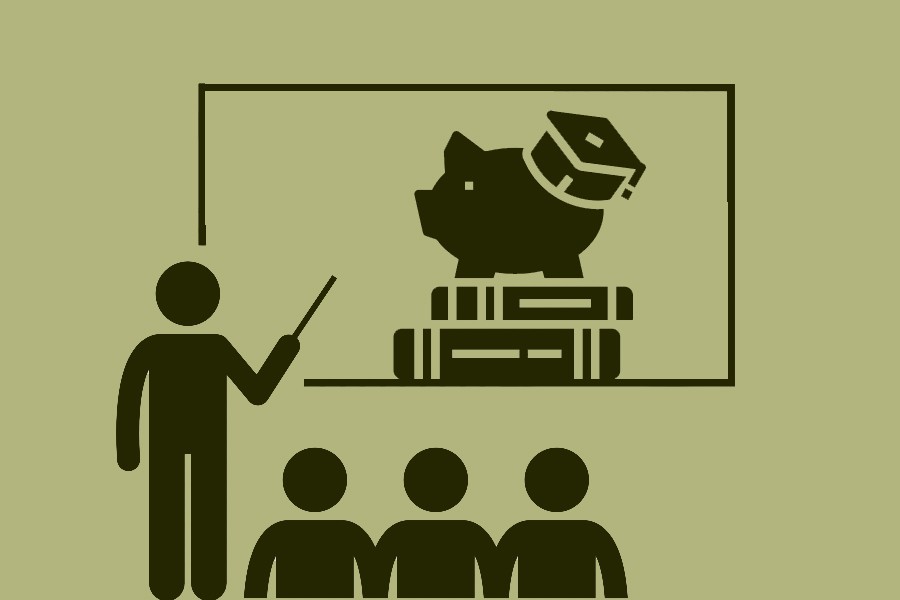
Published :
Updated :

Saving and investing for retirement should be a part of every adult's financial plan because household expenses continue even after we stop earning. In advanced countries, the media does a good job of highlighting this issue thus filling a void in the education system. By contrast, in developing countries, both schools and the media have sidetracked the issue for a long time. This is unfortunate as financial literacy is the road to financial independence.
A financially savvy person seeks out information, not only from competing financial service companies, but also credible on-and off-line sources. He or she is able to weigh alternatives and make the right call regarding products and services that suit his or her priorities. That person can also detect scams. In light of this, of late, several schools in the UK and US have included financial literacy in their curricula. Two weaknesses plague this initiative-sparse coverage and a dearth of trained teachers.
In Bangladesh, poverty is the daily companion of large swathes of the population. Financial planning is farthest from the minds of those who experience hunger and other deprivations on a daily basis. While the percentage of the population under poverty is shrinking, the ranks of the middle-class are rising. The following words of advice are meant for people belonging to the latter group with an aspiration to climb even higher.
The savings habit is best started early to derive the full benefit of the magic of compounding. Young adults, as they enter the workforce, should start saving even if the amount seems small and insignificant. Strong habits lead to behaviour modification: one of these being to live within one's means. Employers, especially larger ones, should take steps to encourage responsible financial behaviour by holding information sessions regularly and inviting neutral industry experts. The recommended first step for the individual is to extinguish costly credit card debt. Secondly, the breadwinner should take out a life policy sufficient to protect dependents-spouse and young children. Thirdly, what is euphemistically known as a 'rainy-day' fund should be accumulated. Equivalent to about six months expenses, this fund could serve as a buffer against periods of unemployment or financial stress. Fourthly, consumer loans, in the form of equated monthly instalment (EMI) loans should be repaid because you end up paying an arm and a leg for bike and auto loans. If you start retirement savings before the above preconditions, your net-worth is more likely to be stalled.
Savings for old age should be built on solid foundations. Even if shares temporarily lose their values, of which there is all likelihood, at least half of the portfolio should remain rock-solid. Let's say a Tk. 20 million nest-egg is being aimed. Fifty per cent or so should be in the form of fixed deposits and/or government securities (sanchayapatras). Sanchyapatras get tax benefit and bank deposits are guaranteed, up to a limit, by the government. Another benefit is that hardly any monitoring is required, record-keeping suffices.
However, the imaginary investor should exercise caution when it comes to purchasing individual shares of companies. A safer bet would be to purchase reasonably priced units of mutual and other funds for the following reasons: (a) funds are run by professional money managers who value their reputations, (b) the funds comprise many different scripts and hence are diversified, (c) the price is justified, & (d) a regular flow of dividends can be expected. The third point is important because firstly, these funds are not out to make a killing and secondly, yield (return) calculations on securities and any capital gains depend on the buying price. After reaching this stage, our mythical investor is ready to take on the topsy-turvy world of the stock market.
Remember that a portion of the portfolio will always be in the form of cash because of the inflow of profits and maturing investments. Finally, I would caution the eager investor not to churn the portfolio unnecessarily. By not buying and selling frequently, you prevent the twin dangers of (a) the risk of buying high and selling low and, (b) paying a fortune to stockbrokers in fees. Over the long haul, this miscalculation will shave a few percentage points from your total returns.
Raihan Amin is a consultant at the Centre for Service Quality Enhancement (CSQE)
raihan.u.amin@gmail.com


 For all latest news, follow The Financial Express Google News channel.
For all latest news, follow The Financial Express Google News channel.